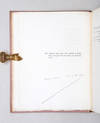

The Meaning and End of Religion: A New Approach to the Religious Traditions of Mankind.
by Wilfred Cantwell Smith
- Used
- Hardcover
- first
- Condition
- See description
- Seller
-
Oregon City, Oregon, United States
Payment Methods Accepted
About This Item
New York, NY Macmillan Publishing Company, 1963. Hardcover First Edition, First Printing stated. First Edition, First Printing stated. Near Fine in Very Good+ DJ: The Book shows only minute indications of use: a hint of smudging at the fore-edge; the pages are no doubt not as bright as when new, but are not 'tanned'; the binding is square and secure;the text is clean. The DJ shows light wear to extremities; mild rubbing; the price has not been clipped; mylar-protected. No longer 'As New', but remains close to it. NOT a Remainder, Book-Club, or Ex-Library. 8vo. 340pp. Hardback with DJ. Wilfred Cantwell[pronunciation?] Smith (1916 – 2000) was a Canadian professor of comparative religion who from 1964-1973 was director of Harvard's Center for the Study of World Religions. The Harvard Gazette characterized him as one of the field's most influential figures of the past century. In his 1962 work The Meaning and End of Religion he notably and controversially questioned the validity of the concept of religion. In his best known and most controversial work, Smith contends that the concept of religion, rather than being a universally valid category as is generally supposed, is a peculiarly European construct of surprisingly recent origin. The anthropologist and writer on religion and post-colonial studies Talal Asad has characterized The Meaning and End of Religion as a modern classic and a masterpiece. Smith sets out chapter by chapter to demonstrate that none of the supposed founders of the world's major religions had any such intention. The one exception on the face of it, he concedes, is Islam. In a chapter titled, The special case of Islam, Smith, a minister in the United Church of Canada whose academic speciality was Islam, argues that the prophet Muhammad would have been, above all others perhaps, profoundly alarmed at any suggestion that he was starting a new religion. Smith points out that the Arabic language does not even have a word for religion, strictly speaking: he details how the word 'din', customarily translated as such, differs in significant important respects from the European concept. Smith suggests that practitioners of any given faith do not historically come to regard what they do as religion until they have developed a degree of cultural self-regard, causing them to see their collective spiritual practices and beliefs as in some way significantly different from the other. Religion in the contemporary sense of the word is for Smith the product of both identity politics and apologetics: "One's own 'religion' may be piety and faith, obedience, worship, and a vision of God. An alien 'religion' is a system of beliefs or rituals, an abstract and impersonal pattern of observables. A dialectic ensues, however. If one's own 'religion' is attacked, by unbelievers who necessarily conceptualize it schematically, or all religion is, by the indifferent, one tends to leap to the defence of what is attacked, so that presently participants of a faith - especially those most involved in argument - are using the term in the same externalist and theoretical sense as their opponents. Religion as a systematic entity, as it emerged in the seventeenth and eighteenth centuries, is a concept of polemics and apologetics". By way of an etymological study of religion (religio, in Latin), Smith further contends that the term, which at first and for most of the centuries denoted an attitude towards a relationship between God and man, has through conceptual slippage come to mean a "system of observances or beliefs", a historical tradition which has been institutionalized through a process of reification. Whereas 'religio' denoted personal piety, religion came to refer to an abstract entity (or transcendental signifier) which, Smith says, does not exist. He argues that the term as found in Lucretius and Cicero was internalized by the Catholic Church through Lactantius and Augustine. During the Middle Ages it was superseded by the term 'faith', which Smith favors by contrast. In the Renaissance, via the Christian Platonist Marsilio Ficino, 'religio' becomes popular again, retaining its original emphasis on personal practice, even in John Calvin's Christianae Religionis Institutio (1536). During 17th Century debates between Catholics and Protestants, religion begins to refer to an abstract system of beliefs, especially when describing an oppositional structure. Through the Enlightenment this concept is further reified, so that by the nineteenth century Hegel defines religion as Begriff, "a self-subsisting transcendent idea that unfolds itself in dynamic expression in the course of ever-changing history ... something real in itself, a great entity with which man has to reckon, a something that precedes all its historical manifestation". Smith concludes by arguing that the term religion has now acquired four distinct senses: personal piety (e.g. as meant by the phrase "he is more religious than he was ten years ago"); an overt system of beliefs, practices and values, related to a particular community manifesting itself as the ideal religion that the theologian tries to formulate, but which he knows transcends him (e.g. 'true Christianity');
an overt system of beliefs, practices and values, related to a particular community manifesting itself as the empirical phenomenon, historical and sociological (e.g. the Christianity of history); and finally, a generic summation or universal category, i.e. religion in general. The Meaning and End of Religion remains Smith's most influential work.
Reviews
(Log in or Create an Account first!)
Details
- Seller
- Black Cat Hill Books
(US)
- Seller's Inventory #
- 43616
- Title
- The Meaning and End of Religion: A New Approach to the Religious Traditions of Mankind.
- Author
- Wilfred Cantwell Smith
- Format/Binding
- Hardcover
- Book Condition
- Used
- Quantity Available
- 1
- Edition
- First Edition, First Printing stated.
- Publisher
- Macmillan Publishing Company,
- Place of Publication
- New York, NY
- Date Published
- 1963.
- Bookseller catalogs
- History of Religion; Religious Studies; Comparative Religion; Religion; General Religion; Interfaith Relations;
Terms of Sale
Black Cat Hill Books
Default shipping charges provided at the time of sale will hold unless the actual cost of shipping is significantly more - or less -t han the default shipping charge quoted. In such cases we will contact you with alternative charges; we will arrive at these charges by the following method: actual United States Postal Service (or UPS) shipping charges + $2.00 handling charge. We guarantee the accuracy of our descriptions and the quality of our packaging. Books we ship may be returned for any reason. If you are not satisfied, notify us via email, and return the book. If we are satisfied that we have provided an inaccurate description, we will refund your return shipping charges, at USPS Media Mail rates. All prices are net to all. Please let us know if we can be of further assistance in expediting your order. Thanks from the folks on Black Cat Hill.
About the Seller
Black Cat Hill Books
Biblio member since 2004
Oregon City, Oregon
About Black Cat Hill Books
Black Cat Hill Books is an Internet-only bookseller.
Glossary
Some terminology that may be used in this description includes:
- First Edition
- In book collecting, the first edition is the earliest published form of a book. A book may have more than one first edition in...
- Good+
- A term used to denote a condition a slight grade better than Good.
- Remainder
- Book(s) which are sold at a very deep discount to alleviate publisher overstock. Often, though not always, they have a remainder...
- Fine
- A book in fine condition exhibits no flaws. A fine condition book closely approaches As New condition, but may lack the...

